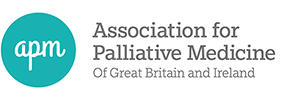Palliative Medicine: meeting the GMC requirements of “Tomorrow’s Doctors”
In the first year after qualification, an average Foundation Year doctor is estimated to care for 40 patients who die and a further 120 patients in the final months of life. Palliative and End of Life Care are thus core skills for all FY doctors. The 2014 Association for Palliative Medicine undergraduate curriculum maps onto the GMC document “Tomorrow’s Doctors” in the following areas:
A) The doctor as a scholar and a scientist
8.b. Explain the scientific bases for common disease presentations.
- Presentation, natural history and management of; cancer, dementia, progressive neurological, respiratory, cardiac, renal, chronic frailty and other life-limiting conditions.
- Benefits and burdens of investigations in advanced diseases.
- Appropriate hope and achievement of goals other than cure.
- Psychological responses and emotions of patients and caregivers; fear, guilt, anger, sadness, despair, collusion and denial.
- The different responses and emotions expressed by patients and caregivers, including fear, guilt, anger, sadness, despair, collusion and denial.
- Recognising unhelpful and potentially harmful psychological responses.
- Social impact of life-limiting illnesses in relation to family, friends, work and other social circumstances.
- Recognising and supporting bereaved people and when bereavement becomes abnormal or complicated.
- Elicit physical, psychological, social, financial and spiritual concerns.
- Recognise and respect that some patients may not wish to know their prognosis.
- Enable those patients who wish to do so to formulate advance care plans.
- Skills in empathic listening and responding appropriately to patient and caregiver concerns.
- Range of drug and other options for symptom management, including; pain, gastrointestinal, cardiorespiratory, genitourinary, neurological and psychological symptoms.
- Management of palliative care emergencies including; cord compression, superior vena cava obstruction and hypercalcaemia.
- Signs indicating that a patient is dying.
Formulate and review individualised management plans for current and potential future symptoms, including anticipatory prescribing.
- Deliver bad news sensitively and at an appropriate pace.
- Deal with difficult questions and challenging conversations.
- Ability to communicate risk and uncertainty.
- Methods for sharing clinical information between services while maintaining patient confidentiality.
- Importance of not imposing personal beliefs, values and attitudes on patients or their families or letting
- Importance of major cultural influences and religious practices which relate to dying and bereavement and their impact on care before and after death.
- The ethical frameworks of autonomy, beneficence non-maleficence and justice in relation to ethical issues at the end of life including;
- The law in relation to end of life care.
- The law concerning Advance Statement of Wishes, Advance Decisions to Refuse Treatment, Power of
- Attorney for Health and Welfare.
- Guidelines produced by the GMC, BMA and Royal Colleges in relation to end of life care.
- Procedures involved in death verification, death certification and cremation; when to liaise with the coroner’s or procurator fiscal’s office.
- The range of multidisciplinary palliative care services available and when referral to them is appropriate.
- Good and timely communication in and between team members in both primary and secondary care.
- Importance and limitations of prognostication and prognostic indicators.
- Ability to discuss prognostic uncertainty with patients and lay caregivers
- Emotional and psychological impact of palliative care on themselves.
- Recognise their own limitations and be able to ask for help and support.
8.c. Justify the selection of appropriate investigations for common clinical cases.
9. Apply psychological principles, method and knowledge to medical practice.
9.c. Apply theoretical frameworks of psychology to explain the varied responses of individuals, groups and societies to disease.
9.f. Discuss adaptation to major life changes, such as bereavement, comparing and contrasting the abnormal adjustments that might occur in these situations.
B) The doctor as a practitioner
13.b. Elicit patients’ questions, their understanding of their condition and treatment options, and their views, concerns, values and preferences.
13.f. Determine the extent to which patients want to be involved in decision-making about their care and treatment.
13.g. Provide explanation, advice, reassurance and support.
14. Diagnose and manage clinical presentations.
14.j. Contribute to the care of patients and their families at the end of life, including management of symptoms, practical issues of law and certification, and effective communication and team-working.
15.a. Communicate clearly, sensitively and effectively with patients, their relatives or other carers and colleagues.
15.c. Communicate by spoken, written and electronic methods.
20.d. Respect all patients, colleagues and others regardless of their age, colour, culture, disability, ethnic or national origin, gender, lifestyle, marital or parental status, race, religion or beliefs, sex, sexual orientation, or social or economic status.
them influence professional judgments.
20.g. Knowledge of laws, and systems of professional regulation through the GMC and others, relevant to medical practice, including the ability to complete relevant certificates and legal documents and liaise with the coroner or procurator fiscal where appropriate.
- Double effect.
- Requests for euthanasia and assisted dying.
- DNACPR decisions.
- Withholding / withdrawing treatment.
- Withholding / withdrawing clinically assisted nutrition and hydration.
- Capacity to give consent; Mental Capacity Act.
22.a. Understand and respect the roles and expertise of health and social care professionals in the context of working and learning as a multi-professional team.
23.b. Deal effectively with uncertainty and change.
23.i. Recognise own personal health needs, consult and follow the advice of a suitably qualified professional, and protect patients from any risk posed by own health.
Dr Stephen Barclay and Prof John Ellershaw
On behalf of the Association for Palliative Medicine Undergraduate Education Special Interest Forum
February 2014

